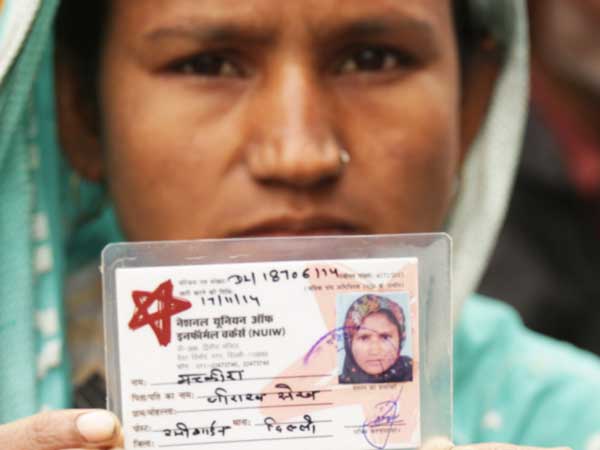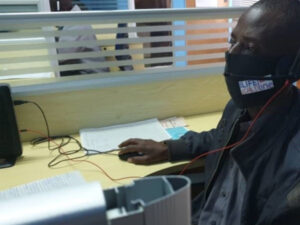Nidan is a social justice organization that works to empower marginalized people through community-based interventions. Their areas of focus are the rights of unorganized laborers in education, health, livelihoods, and the protection of children working in the informal sector.
Arbind Singh of Nidan spoke with Lissa Harris on January 11, 2024. Click here to read the full conversation with insights highlighted.
Lissa Harris: Can you start by introducing yourself and your organization, and talk a little bit about the problem you’re addressing? How are you going about solving it?
Arbind Singh: My name is Arbind Singh. I studied sociology here at Delhi University. After my studies, I returned to my home state, and I started working for an NGO that works for the empowerment of women. While working for that NGO, I realized that people have offices in cities, but they work far away, sometimes 500 kilometers away, from their office, so they don’t see the poverty. At that time, India was more known for rural India. Urbanization was just picking up. There was this incident of street vendors being evicted in our city, so I suggested to my boss, “Why don’t we start working with them?”
I took her to some meetings, and she wanted very much [to do this work], but she felt that the organization might not be ready. She encouraged me to set up an organization for that instead. I was young at the time, and I was a little hesitant to attempt institution-building, but she encouraged me and promised she would help me. So I took the plunge, and this is how we started Nidan. We started in December of 1995 in Bihar, which is one of the most backward states of the country, and we began working with street vendors. Gradually, we broadened to work with other informal workers, their children, and the youth. This was, broadly, Nidan’s field of work.
As we worked, we realized that organizations come and go, and projects come and go. We needed to create a vibrant and sustainable organization, and in that process of creating a sustainable organization, I became a social entrepreneur. I tell my colleagues, “You might work here, you might get an opportunity in some other organization. But the people for whom the project was created, they will remain here. So if the project is not able to change their life, it will be a failure. Not for us, it will be a failure for them.” That’s a big challenge.
Lissa Harris: Can you talk a little bit more specifically about what problems you’re trying to solve for the people who are your target group?
Arbind Singh: When we started working, the unorganized workers didn’t have any recognition or any legal rights. They were called informal workers because they were outside the formal system–outside the labor laws, outside social protection schemes, that kind of thing. My aim right from the beginning was to act much like a typical trade union or a typical activist: not just to raise voices in a very stereotypical manner, but in different manners. Raise voices and bring change. Get changes in policies, get changes in laws, get changes in programs, get new programs. Pilot and implement the programs at the grassroots level. From the bottom, you take the issue to the top. When you get the changes done, you bring it down to the ground.
I’ll give you an example. At that time, health insurance was beyond imagination for informal workers, and for the poor. We piloted a project on health insurance. It took three or four years, and the coverage increased considerably. Representatives from the Indian government visited the project and took lessons from it. Then they started a program called Rashtriya Swasthya Bima Yojana, which is a national health program.
Initially, the idea was to pilot it through NGOs, but then the finance minister felt that, no, it should be done through the government. That program began in a small way, but with the present government, they increased the scale. Now, the coverage is 500,000 rupees, and more than 30 million people have been enrolled. We did many similar projects that became quite sustainable. Everywhere, we focused on sustainable, systemic change.
For systemic change, you need two things. One is government programs, policies, and laws, and the second is preparedness of the people. If people are not ready for the change, [it will not work], so you need community institutions. One of our most successful examples has been the organization of the street vendors. We created a national-level network called the National Association of Street Vendors of India. It was very popular, naturally. Thereby, we got a national policy for urban street vendors established in 2004. Based on the successful implementation of that policy, in 2014 we got it converted into a law. We did a big campaign around that, and fortunately it was passed by both houses of the Parliament.
This is a very comprehensive law, one of its kind in the world. The other day, the minister was in one of our meetings, and he said that 3.8 million street vendors have gotten licenses under this law. A very interesting concept developed from this policy: establishing a town vending committee. It’s a multi-stakeholder body in a municipal body, in a municipal corporation, headed by the commissioner. That town vending committee makes decisions about every aspect of street vending. If a decision is taken by a municipal corporation without the recommendation of the town vending committee, that decision is considered illegal.
In 2002, the International Labor Organization for the first time organized a session on informal workers, and I got invited to that. Being there, I felt that all the negotiations happened under the umbrella of a tripartite agreement: government, employer, and employee.
But for people like street vendors, where there is no direct employee, what was the idea? I came back and I started asking people, “What is the idea for street vendors?” This concept of a town vending committee developed. Now, they exist in every city in India; roughly 4,600 town vending committees have been constituted. They meet. The police are there, along with the traders’ representatives and the other land-owning authority representatives, and they make decisions.
We seized this opportunity to advocate for a credit program for street vendors. In Delhi, I noticed very bad money lending among the street vendors. Once you are indebted, throughout your life, you keep paying the interest. The principal remains there. So we developed this credit program, the government launched it, and because there was so much need for it, so much thirst for credit, this program has become a big hit. Six million street vendors now have access to this credit program.
We continued organizing to advocate for our cause. We started organizing a street food festival, and it has become a signature event in Delhi. People wait for this festival. It’s a ticketed event, and it’s about $2 per person, which is a big amount here in Delhi. So people are paying money to enter this street vendor event, and we get a lot of media coverage. That has been one of our major successes.
I think that, as a social entrepreneur, one should be able to create systems and institutions that provide people with more resources and more rights, more ability to enhance their income and take care of their families while also contributing to the growth of the country.
We started in the state of Bihar and gradually expanded to almost all parts of the country. In 2007, we opened an office in Delhi. We needed to campaign for changes in the law, and Delhi helped us expand across the country in a very convenient way. In India, if you are established in Delhi, you have more recognition. People think you are coming from the national capital. It’s easier to connect with municipal bodies and state governments across the country.
Lissa Harris: When you think about the people in the communities that you serve, are they exclusively informal workers, or are you working with other populations? Who do you serve directly, and how do you engage with them?
Arbind Singh: Yes. We have different categories of support. For example, in every city we have formed a town-level federation for street vendors. It might have a different name in different places, but the market leaders come together and create a town-level federation. They make decisions collectively, and they have their own leaders among themselves.
We have recently launched an app, and we intend to enroll around 1.5 million street vendors in that app by the end of this year. It’s a paid subscription, we will help link street vendors with municipal bodies, with the credit program that I talked about, and with information. This is one way we engage with them.
We also offer financial services. For example, when I came to Delhi, I was appalled by the money lending I saw, so I didn’t wait for the banks. We set up a thrift and credit cooperative. Now, around 6,000 members are in the cooperative, and it supports micro-entrepreneurs to a great extent. They can get a loan of up to 200,000 INR without any substantial paperwork because they are from the community. It has helped a large number of people grow their businesses, and it also helps them buy houses and other things.
We have 22 of these offshoots. There is a cooperative for waste pickers. They get into solid waste management, segregation of waste, composting, and housekeeping work. It’s called Nidan Swachh Dhara Pvt Ltd, NSPL. That is for the waste pickers. Similarly, we have one for artisans called Angana. Angana means a courtyard in traditional India. They have showrooms, they participate in exhibitions, and they’re able to sell their products. These are all worker-owned cooperatives. Similarly, there are other cooperatives. We have one in Mumbai. We have one in Patna.
I’ll give you one more example. There were these rural women’s groups that were looking for employment opportunities. We engaged with the government of Bihar, and we set up a fortified food plant. They supply the take-home rations to the ICDS [Integrated Child Development Service] centers, which serve children from three to six years of age. Now, we are helping them develop methods of preparing fortified food, which can be sold in the market directly rather than just supplied to the government. We have been able to create these kinds of models, as well as policy inputs, at many levels.
Lissa Harris: What do you think makes your approach distinctive from other organizations that are working in a similar space?
Arbind Singh: We engage with the government a lot. We love the government, we hate the government, we work with the government. We drag them to court. We organize protests. So many times, the government is confused, but they appreciate our work because it’s not about us, it’s about the people for whom we work. There is a lot of clarity of thinking. For example, we are piloting a cow dung-based plant in seven districts called Gobar Gas. The money is being provided by the state government. We don’t shy away from taking money from the government. Many people fear that they might have to bribe, but believe me, we haven’t paid a single penny in bribes.
We have to be patient when working with the government, and we need to have our own reserves if we want to work with them because they will delay. They will think we’re going to bribe them. That is a definite. We believe that not only government resources but the government itself should be working for the people, and they should have pro-people policies and programs. We go to any extent working with the government, except for bribing and sycophancy, or that kind of thing.
Second, we try to build people’s institutions. It’s not only that we run projects. Wherever we work, whether it is with a self-help group, a cooperative, a market association, or a trader’s guild, we try to build associations of people who can take the work forward.
Third, we try to create sustainable projects. We convert projects into institutions. For example, somebody provided us with money to pilot this credit program for the street vendors in Mumbai. That pilot ended in December, but our work did not. Our work will go further. Our work is not linked with projects, though we use the projects to build it out and make it sustainable.
Fourth is innovation. We are not fearful of innovations, and we don’t mind testing grounds. We keep on doing social innovations. Sometimes we have been unsuccessful, and we have had to withdraw. For example, our solar project was not successful. We couldn’t make them sustainable because the servicing cost was very high. There were additional issues of service, and people were unwilling to pay. So we withdrew.
Lissa Harris: What is your favorite example of something that illustrates the impact of the work that you do?
Arbind Singh: My most favorable work has been my work with the waste pickers. I think we started before the country was ready for it, but now there is a lot of scope and the conditions are much better, so we are restarting these initiatives. But we did considerably well at that point in time, and it created a lot of impact. For example, waste pickers were considered untouchables, and they were not allowed into homes. We organized many interactive sessions and events with residents and children. The children became very friendly with the waste pickers. They would call them brothers and sisters, and they would let them into their homes. We increased their acceptability [in society.]
Supporting street vendors is another one of my favorite initiatives, especially the food festivals we organize. We are expanding that to other cities, including Bangalore and Mumbai. The Indian government has also started organizing such events. Often, a street vendor will earn as much money at these events as they do over the entire year. That’s a big experience for them, earning almost an entire year’s income in three days.
There is also a beauty apparent in attending a town vending committee meeting. The street vendors, who once feared the police and municipal inspector, and forget about the commissioner, are sitting in a circle, right there right in front of these people, talking about issues and trying to find solutions. Imagine there are 4,600 street vendors, and say 50% are not active. There are still 2,300 active street vendors, which is a big, big thing. I attended a few meetings myself, and I was enamored by the way things were being discussed.
The last time I was in Patna, the street vendors were in very bad shape. They were planning a protest. They came and met me, and they asked if I would join their protest. But the next day, they had the town vending committee meeting. After the meeting, they gave me a call saying, “We have decided on another course of action.” They told me that during the meeting, “We thrashed out every issue, and the commissioner agreed on all the issues. So we don’t need a protest.” That they achieved such a negotiation and have come to this level is very inspiring.
I also gave you the example of the thrift and credit cooperative. I love the impact. Every time I visit, I meet people who have changed their lives simply through access to credit. There are many, many examples.
Lissa Harris: What practical advice or teachable lessons do you think can be taken from your work by other people who want to have similar success in this kind of space?
Arbind Singh: One is that you should have multiple sources of revenue. That has helped us a lot. We don’t depend only on our own revenue, nor do we depend solely on the government, or on foreign sources, or on Indian CSR [corporate social responsibility.] We have a very broad base of revenue sources. If something is not coming from here, something will come from there.
Secondly, fortune favors the brave. Whenever I have a problem in my life, I try to rely on the old proverbs. I have always found them to be time-tested. When we were expanding, and when we were moving to Delhi, we had a wonderful, well-established office, yet I was really tense about whether moving to Delhi would lead to failure. Then I remembered: “Fortune favors the brave.” Because we came to Delhi, we were able to get this law established for street vendors. No other country has this kind of law for street vendors, and I feel very happy that it is being rolled out. There are other issues, like governance issues, but I am very sure that with time, things will change.
The practical advice I have is to engage with the government. I consider any event we’ve organized as a failure, a flop, if there are no government representatives present. They need to know [what the issues are.] They need to learn from us. If we just keep on talking amongst ourselves, then it’s like a marriage ceremony without a bride and groom. I have told this to high officials. We focus a lot of attention on government engagement. It doesn’t matter which political party it is, that doesn’t matter to us.
Lissa Harris: How do you measure your success? What evidence do you use to see that you are making progress?
Arbind Singh: We don’t have a large team, so we have one person to monitor success. She collects data of different kinds. There are also studies, some researchers peeping in, doing some research. Today, for example, we had a professor from Italy. He wants to research the town vending committees. We will help him with the data and the fieldwork. We have some kind of research going on all the time, and we track data across the states.
Lissa Harris: You mentioned that the solar project you tried didn’t work out. Are there lessons you can draw from things that you tried that didn’t work?
Arbind Singh: The main reason the solar project didn’t work was that the supply system was not strong. We depended on an agency for the supply, and that agency’s systems were very cumbersome. They never told us the source, so we couldn’t get to the source ourselves. For example, in this cow dung gas project which we are doing presently, we depended on one agency from Gujarat. Well, we found out after seven months that this agency was just playing with us rather than giving us the right kind of equipment. We terminated the relationship, we found another agency, and we started doing it on our own. With the solar project, we couldn’t do that. We remained dependent, and finally, it had to be closed because it was creating financial loss.
Lissa Harris: Setting aside the issue of funding, because funding is an issue for everyone in the field of social change, what other challenges have you faced that you haven’t yet been able to solve? What other large barriers are you still working to overcome?
Arbind Singh: Governance is one issue. Despite our efforts to engage with the government, despite all our push, there are still issues in governance. Secondly, the way the tax regimes and others are tightening the social enterprises in India is creating a lot of problems. Notices from income tax, notices from the GST [goods and services tax], and general sales tax are becoming common.
For us, recruiting people is not easy. You can’t have a typical master’s in social work in our area because we don’t work in an enterprise mode. We work in a change mode. Our team needs to have people with many skills. That’s a big challenge. It’s not enough to have a social media person; we need a social media person who can undertake campaigns that are economical and campaigns that draw on others’ strengths. On our team, we have a lawyer, and we have a social activist. We need typical social activists, who can go and start shouting in front of the police station. Then we also need to have economists and marketing people, as well as people with MBAs who can plan events and develop business plans for these enterprises. It’s a very tough kind of team management. For example, in our food fortification project, we had to engage an institute for developing products. We need to have multiple kinds of people on board.
Lissa Harris: Can you talk a little bit more about how you work with governments, whether that’s at the municipal level or the state level? How do you get the government to the table to work on these initiatives?
Arbind Singh: One is you need to have a very positive image. Your image should be people who are strong on the ground, people who can move things, people who can help you achieve targets. People who are not quarrelsome, who have vision, and who understand the mindset. Second is you don’t have to go very close to them. That can become dangerous for the organization. You need to have that clean balance between the extent to which you are going to engage and where you can maintain because they are very smart to incorporate you in their system. But you have to keep that distance.
Third is that, when it comes to payment, you have to be very transparent. Your systems, your writing, your letters and your documentation all have to be very strong. Otherwise, they’ll blame you tomorrow. When I receive any letter from the government, the first thing I check is whether they have said, “Arbind, you have been blacklisted.” This psychological fear has been in my head for the last 25 years.
Our writing is crucial because we can at least say, “Look. We have been writing to you. You are not noticing. You are not communicating with us.” You need to communicate and keep sending mail about what you are doing, and what you’re not doing. My personal strategy is to take their WhatsApp number and communicate with them directly. Whether it is a minister, whether it is a municipal commissioner, whether it is the state secretary, I take their numbers and communicate directly.
Lissa Harris: Can you talk a little about how you’re working to advance systems-level change in specific ways? How are you trying to push for broad systemic change?
Arbind Singh: Whatever work we do, the experiences of the grassroots have to feed into the policy. In return, the policy-level changes have to come back to the grassroots. For example, the fortified food plant I was talking about led to the government issuing a direction that all the ICDS centers should have take-home rations for kids and lactating mothers through the fortified food plant. Every district has some 200 centers, so just imagine [that happening across] 34 districts with 200 centers each. That is very important for us. These kinds of changes are very important for the people.
Similarly to the town vending committees, now the government of India has a Department of Cooperation, which oversees cooperatives. That is not only because of us. Other people have been working on cooperatives, so it’s because of that [broader effort.] Earlier, cooperation was a section of the Ministry of Agriculture. Now there is a Department of Cooperation in the Ministry of Home. The minister of home in India is the second most powerful person after the prime minister. Those kinds of changes are necessary.
Then we have this credit program, which goes through December 2024. I am sure that after December 2024, the street vendors will not need a program. They are now in touch with the banks, and the banks are treating them as good customers. After that, you don’t need a program. It becomes part of the system.
Lissa Harris: What do you think is most needed from other actors or partners in this space–whether that’s the government or these cooperatives or other entities–to advance this kind of systems-level change? What do other people need to do?
Arbind Singh: At every level, citizen participation is very important. We have this slogan, “Nothing for us, without us.” For systemic changes, you need to involve people. Not merely to consult them, but to involve them in decision-making. In a democracy, people feel that once you have elected leaders, now these leaders are the people who will govern, who will make decisions. But in every aspect, I think there has to be a human institution. For example, if [people themselves] are involved in decision-making around waste management, instead of the municipal corporation getting mad about it, the waste management will get much better.
Lissa Harris: How do you see your work evolving over the next five years?
Arbind Singh: I don’t know because the next five years will be very decisive for us. There is a trend in India of keeping the marginalized separate. You give them what we call “schemes,” but keep them away from the mainstream. So it’s going to be very difficult for us to keep the gains we’ve made and to further those gains. The present policy of the government is to let large corporations grow. Let big families grow, and let them control everything.
We need to push our work with micro-entrepreneurs, small businesses, and street vendors so they are able to shine. That’s going to make the next five years very tough and very challenging, but if you perform well in a challenging environment, you can do even better. For example, COVID was a very bad time, but that was the best time for our work engaging with the government.
At first, we were at a loss. We didn’t know what to do. Markets were closed. The street vendors were calling us and asking, “What will happen?” Then somebody suggested hosting webinars through Zoom.
They explained that you just have to click a button; you don’t even have to create an email ID. So we started using Zoom. You won’t believe how many webinars we organized. And I was surprised to see the government of India participate in every webinar. I realized that it was a challenging time, but also a time when we could push ourselves to perform better. As an organization, we did much better during COVID in terms of helping members and in terms of getting government support. A lot of programs came from that time.
I think in challenging times, people are more careful. Members respond fast. They know it’s a difficult time. So the next five years are going to be challenging, but I think we will continue to do better.
Lissa Harris: Thank you so much for being generous with your time and for being part of this project.
Click here to read the full conversation with insights highlighted.
Lissa Harris is a freelance reporter and science writer (MIT ’08) based in the Catskills of upstate New York. She currently writes about climate, energy, and environment issues from a local perspective for the Albany Times Union, her own Substack newsletter, and various other digital and print publications.
* This interview has been edited and condensed.
Learn about other organizations that provide innovations in social justice.







